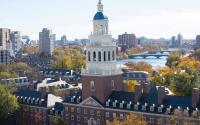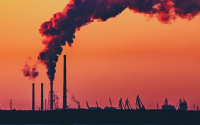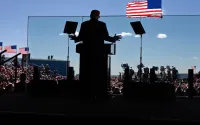Global warming is causing the Arctic ice-cap to melt at such an unprecedented rate that by the summer of 2070 it may have no ice at all, according to the most comprehensive study carried out on global climate change in the region.
The icecap has shrunk by 15% to 20% in the past 30 years and the trend is set to accelerate, with the Arctic warming almost twice as fast as the rest of the planet, due to a build-up of heat-trapping gases.
The report found that the changes are likely to harm native communities, wildlife and economic activity, but also highlighted some controversial short-term advantages: oil and gas deposits will be easier to reach, more farming may be possible and shortcut trans-Arctic shipping lanes may open, shortening the sea journey between the UK and Japan by up to 12 days.
The findings support the broad scientific consensus that global warming is caused mainly by rising atmospheric greenhouse gases as a result of emissions from cars, factories and power plants.
Conducted by nearly 300 scientists, as well as elders from the native communities in the region, the report was commissioned in 2004 by the eight countries with Arctic territories - including the US - amid a growing sense of urgency about the effects of global warming on the region.
The report says that "while some historical changes in climate have resulted from natural causes and variations, the strength of the trends and the patterns of change that have emerged indicate that human influences, resulting primarily from increased emissions of carbon dioxide and other greenhouse gases, have now become the dominant factor".
The Arctic "is now experiencing some of the most rapid and severe climate change on Earth", the report says, adding: "Over the next 100 years climate change is expected to accelerate, contributing to major physical, ecological, social and economic changes, many of which have already begun."
Examples include Inuit hunters falling through previously stable ice, permafrost thawing and destabilising foundations of buildings, and the habitat of creatures from polar bears to seals melting away.
"We are taking a risk with the global climate," said Paal Prestrud, vice-chairman of the Arctic Climate Impact Assessment report.
The WWF environmental group yesterday accused the eight nations - which account for 30% of global greenhouse gas emissions - of hypocrisy in sponsoring the report while failing to take action.
"The big melt has begun," Jennifer Morgan, director of the WWF's global climate change campaign, said in a statement. "Life on Earth will change beyond recognition with the loss of the ice sheet at the north pole and higher sea levels threatening major global cities such as London."
George Bush pulled out of the UN's Kyoto protocol on global warming in 2001, arguing it was too expensive.
The other Arctic nations have agreed to Kyoto's emission control target.
http://www.guardian.co.uk./print/0,3858,5053580-110970,00.html






